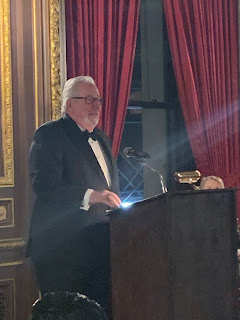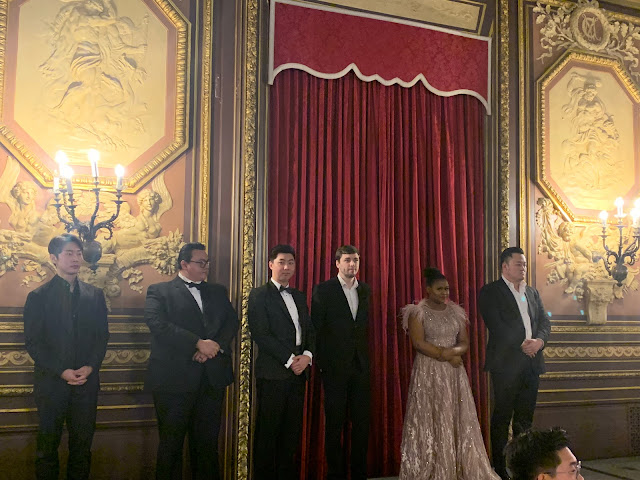Mannes Opera Students
Although Managing Artistic Director of Mannes Opera Emma Griffin announced the evening as a "workshop" with minimal rehearsals, we thought the production given to Nico Muhly's Dark Sisters was first rate and required no apologies. Laine Rettmer's direction told the story (based on a true event) effectively; Geoffrey McDonald's conducting of the orchestra was up to his customary high standards; the singing of the six women and the lone bass-baritone was exemplary and notable for the clarity of their diction.
The story concerns the effects of the government raid of a compound occupied by "The Prophet" and his five "sister wives" in which all the children were removed. The opera opens with a disturbing and dissonant orchestral clash followed by the five women lamenting the loss of their children in an interwoven choral episode. Choruses were performed a cappella or with spare accompaniment which we preferred to what sounded to our ears like a mismatch of voice and orchestra.
Although there was some interesting orchestration to be heard, the vocal lines were not among them. More credit goes to the cast for making music out of Stephen Karam's prosy libretto. We thought this would have made a fine play! However, we did not think the music added to the story in the way that Poulenc's music and libretto (based on a play by Georges Bernanos) complemented and reinforced the storytelling of a different true story--Dialogue des Carmelites.
It is easy to be critical of the beliefs of religions other than one's own but that amounts to throwing stones when one occupies a glass house. Did "The Prophet" truly believe the nonsense he foisted upon his wives? Or was this just another case of men controlling women to suit their own desires. We couldn't help but think of the animal world in which one male keeps a herd of females for his own insemination.
The way the talented Christopher Lau portrays him manages to sustain a hint of ambiguity. There is plenty of ambiguity in the women as well. Eliza (well portrayed in the Saturday night cast by Sofia Durante) is the rebel in the group and uses her feminine wiles to blow the whistle on The Prophet. As the seriously troubled Ruth, Ziwan Nie was nearly mute but heartbreaking. The other women kept up the pious front and vied for the "favors" of The Prophet, probably brainwashed into believing the need to "stay sweet", a euphemism for obedience and submission. There was plenty of female "cattiness" and rivalry as one might expect. A parallel might be drawn with the complex households in ancient China in which there were several wives, often sold into what amounted to sexual slavery at a very tender age.
Mr. Lau had another role as a TV reporter, sitting in front of a photo of the Utah red rocks and interviewing the women who responded in unison as they had been brainwashed to do. To his credit, he colored his voice differently and altered his posture for this secondary role.
The other women in the cast were equally fine, including India Rowland, Emily
Summers, Joohyun Kim, and Carolyn Boulay.
The orchestral music, whilst not particularly melodic, offered some fine solos and duets for instruments of which we are very fond--English Horn and Bass Clarinet, not to mention the cello, harp, and percussion. No credit for costuming was given but the women looked appropriately inhibited in long drab garments and clunky boots.
© meche kroop




